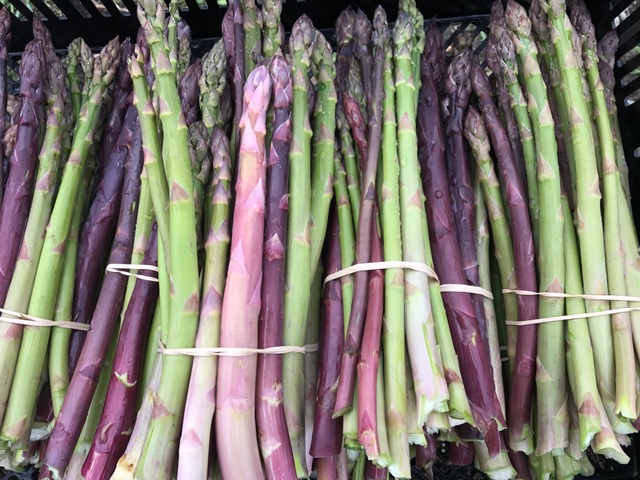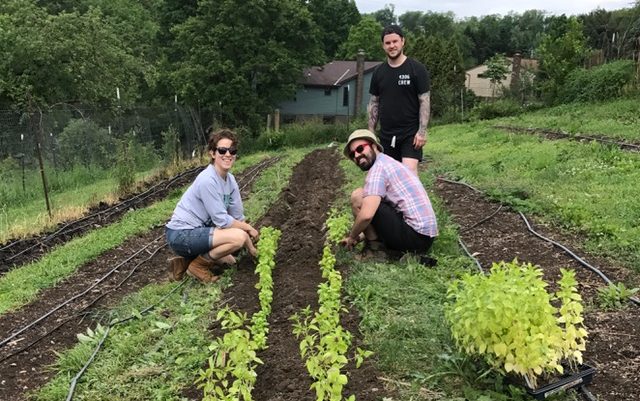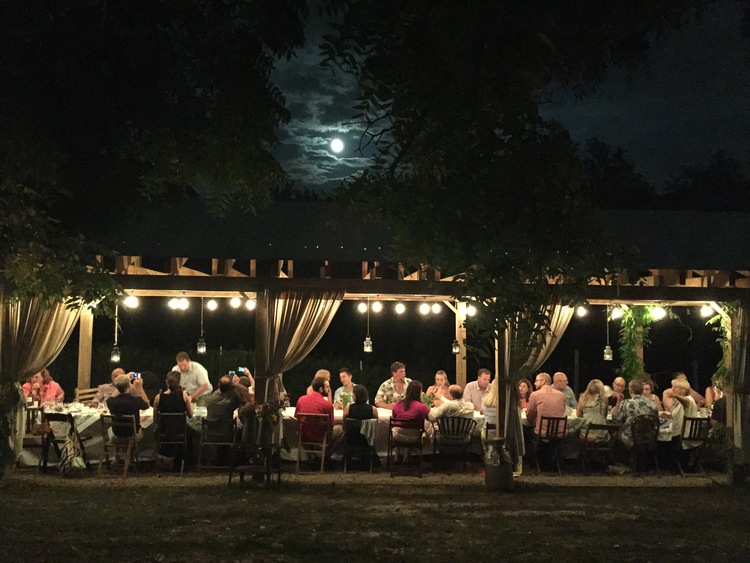In her own words, Tara Rockacy of Churchview Farm is “bonkers” about heirlooms. On her ten-acre farm she lovingly cultivates 142 varieties of heirloom tomatoes. Though she cherishes her heirloom peppers, greens, squash, asparagus, melons, and whatever else you can think of, the tomatoes will always be her favorite. “There is so much attention that goes into that crop,” she says affectionately. It’s obvious that the people of Pittsburgh have taken notice: fifteen local restaurants use food she grows, with many more on the waitlist.
It all started in the 1930s, when Tara’s grandparents, Emil and Hilda Rockacy, purchased the land that is now just outside the city limits of Pittsburgh. They grew produce there that would nourish their children, and eventually their grandchildren’s interest in sustainable food. Growing up on the plot adjacent to the farmhouse, Tara was steeped in natural farming methods from a young age. Growing up, it never occurred to her to farm, but as an adult, she started gardening with a zeal that only a dedicated farmer would classify as ‘casual.’ From her apartments in the east end of Pittsburgh, she started with rooftop container gardens, and soon convinced her landlord to let her rip up the front lawn to install a veggie garden. She gardened after coming home from work at the Carnegie library and on weekends. She was smitten.
Her grandmother decided to move to an assisted-living facility just as Tara was thinking she might be ready to buy a house. Her parents suggested she buy it, though Tara didn’t need too much convincing. “I thought that would be an awesome place to explore this new hobby I had: growing food.” She looked forward to owning her own farm and engaging with organic and sustainable production, following in Emil and Hilda’s footsteps. She officially moved to Churchview in 2007 and started gardening with more gusto than ever, producing more than she could eat herself.

One evening, after a party in 2008, Tara’s friends staged an intervention. They loved being the recipients of the her produce, but when the party host Jennifer Maurer asked her to bring some basil for cocktails that evening, Tara showed up with a trash bag full of it. Tara’s friends were used to this kind of experience. She had more food than she could give away and it was time to reckon with it.
Capitalizing on the growing demand for good food in Pittsburgh, Tara started a CSA (Community Supported Agriculture) of her own in 2009, delivering fresh produce to seventeen local families. Despite the growth of her farm business, she continued to work full time as a librarian, and it was only after two exhausting years that she started to phase out her work at the Carnegie Library. By early 2014, Tara was a full time farmer, operating Churchview Farm primarily with a staff of one. If you ask Tara how she managed to do the whole thing alone, she’ll laugh and say “I can’t remember how I did it honestly. When I look back on it now I just can’t… it sounds horrible,” she jokes.
She did have some help in the form of her parents, who still lived in the neighboring property she grew up in. They were happy to volunteer occasionally, as was her partner at the time. Nonetheless, her most reliable helpers were her CSA recipients. They were thrilled to have a chance to commune with nature, to be on Tara’s farm with their hands in the dirt. Their enthusiasm prompted Tara to rearrange her CSA into a workshare program in 2013, asking individuals to commit to working on the farm one full day each week during the growing season in exchange for produce. Her twelve workshares, along with occasional volunteers and interns, do the majority of the farm work now. They come to the farm with varying levels of experience. Some are there to learn the detailed ins and outs of growing their own food, and some are there simply to take advantage of being outside in the fresh air and sunshine. She adds newcomers to the team annually, though some have been at the farm since the program’s inception.

Churchview draws a varied crew of Pittsburghers to its fields, including professors, nutritionists, and bartenders. On days that they work, she observes “these really fluid conversations, literally over growing food in the field. It’s pretty amazing.” They talk about politics, current events, and the local food scene as they weed pepper plants by hand. They unite over the food that they grow, forming a close-knit community of their own.
“People want to be part of their food system. They don’t want to be divorced from it like so many Americans are.”
The farm may have started as a one-woman operation, but now it is a community-supported effort. When individuals join the workshare, they become part of the farm too. The popularity of the program took off: every year, the workshare program has a waitlist. Tara thinks urbanites are drawn out of the city to Churchview Farm because “people want to be part of their food system. They don’t want to be divorced from it like so many Americans are.”
Tara’s other groups of supporters are chefs and restaurants. Because she knew so many chefs socially when she was getting started, Churchview has not had to advertise, instead relying on word-of-mouth endorsements. “Chefs just started showing up,” Tara says. One day a chef from a local catering company pulled into her driveway. “He said ‘I’ve heard about you. And I’ve heard about these tomatoes. And I’d like to buy some.’ I remember having no idea what to even charge for something like that.” Now Churchview provides produce for fifteen restaurants.

When she first started, Tara couldn’t have imagined the runaway success of her small farm. Summer events (think: BBQs, happy hours, and yoga) tend to sell out, and the space is booked all summer and autumn for weddings. Tickets for the fifth season of her farm dinners, a series that feature local chefs preparing meals eaten on the farm, sold out in January. The farm’s outdoor kitchen is just a stone’s throw from the dining table, and guests are often invited into the kitchen to see what is being prepared. Chefs love being able to interact directly with guests and share their intentions behind each dish. Tara’s farm has created a community of food lovers, excited to engage more deeply with their local food system.
Tara credits the farm’s proximity to the city for her success. But there’s more at work than that. “I have been so lucky,” she says. She has tapped into a movement and a community of people interested in supporting farmers who are growing the good food movement, and interested in digging in to do it themselves too. Her dedicated supporters are her biggest asset: “I have amassed a really amazing group of people who help me, who guide me, who do hands on stuff. I mean, these are my good friends, my family, and so many people who have been so generous with their time and talents,” she says. That community is what makes her so optimistic about the farm’s future. “That’s why I think this farm is very much a community effort; its success belongs to a lot of people, not just me. As we move forward, we’ll continue to pull from that.”




